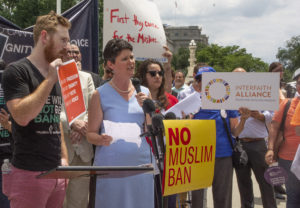
BJC Executive Director Amanda Tyler speaks on the steps of the U.S. Supreme Court on June 26, 2018. ““We are deeply disappointed by the Supreme Court’s refusal to repudiate policy rooted in animus against Muslims. … Safeguarding religious liberty requires the government to remain neutral with regard to religion, neither favoring one religion over another nor preferring religion or irreligion.”
The Baptist Joint Committee for Religious Liberty fights against efforts to target religious groups based solely on their faith. Since the Sept. 11, 2001 attacks on the World Trade Center, anti-Muslim rhetoric has increased, along with efforts to limit or restrict the rights of Muslims.
The American experiment in religious liberty has been successful in large part because it has been able to protect the religious freedom of “fringe” religions — including Baptists in colonial times and Catholics and Mormons in the 19th Century. In several recent situations, the BJC has defended the rights of Muslims to practice their religion freely. These efforts include letters written to members of Congress, meetings with administration officials, participation in interfaith groups working for the same protections for all, and opposing misguided “anti-Sharia” measures.
Click here for more on our current efforts defending religious liberty for all people.
Below are a few historical examples of our work standing against Islamophobia.
- On January 27, 2017, the Baptist Joint Committee condemned President Donald Trump’s executive order that included a religious test for future refugees. BJC Executive Director Amanda Tyler said the action is a “back-door bar on Muslim refugees” and it sends the un-American message that there are second-class faiths. “A threat to anyone’s religious liberty is a threat to everyone’s religious liberty, and we as Baptists stand with those facing religious persecution around the world, regardless of their faith.” Click here to watch Amanda Tyler’s statement on the steps of the U.S. Supreme Court on June 26, 2018, after the Court’s troublesome final ruling in the case.
- The BJC joined a brief in the U.S. District Court for New Jersey in 2016 in the case of Islamic Society of Basking Ridge v. Township of Bernards, asserting that the Religious Land Use and Institutionalized Persons Act prohibits different municipal rules for building a mosque than for a church.
- The BJC joined dozens of political, religious and human rights organizations to urge the United States Department of Justice to investigate the New York Police Department’s surveillance of American Muslim communities. The letter highlighted specific areas in which these practices have hindered the lives of Muslims in the New York area, including disruptions that have “diverted precious time and resources away from religious education and counseling, both of which are part of mosques’ core religious mission.” In February 2014, the NYPD announced the end of its program.
- The BJC denounced Congressional hearings targeting American Muslims in 2011. Our work during this time included a letter sent to House leaders asking them to raise concerns about the hearings and a direct appeal to the committee chair asking to broaden the scope of the hearings. BJC Executive Director Brent Walker joined others in a press conference calling fellow citizens and political leaders to the “bedrock American principles” of pluralism and religious freedom.
- A rise in anti-Muslim sentiment in 2010 provoked crimes, protests and intimidation toward American Muslims and mosques across the country. BJC Executive Director Brent Walker and leaders of Muslim, Jewish, interfaith and other groups met with members of the Department of Justice – including Attorney General Eric Holder – to discuss how the Department was ensuring religious freedom for all during this time. Additionally, when many decried a mosque proposed for a site blocks away from Ground Zero, Walker called on others to protect religious freedom for all people in The Washington Post’s “On Faith” project. “Many of the recent statements that affirm religious freedom, while questioning the ‘wisdom’ and ‘appropriateness’ of this project, ring hollow,” Walker wrote. “The burden of ensuring that all enjoy religious freedom equally falls to all of us.”
As Walker wrote in 2013 after reports of anti-Muslim sentiment in the wake of the Boston Marathon bombing, “Common sense, as well as Christian charity, tells us that it is wrong to scapegoat— to blame an entire religion for the despicable acts of a handful of murderous outliers who claim that religious affiliation.”
For more articles on this topic:
“Unprecedented” call to close U.S. borders to Muslims is un-American
BJC’s Blog from the Capital
December 17, 2015
Protect religious liberty: Reject false narratives, big and small; condemn violence, not religion
By K. Hollyn Hollman
November/December 2015
Reaching out to our Muslim neighbors
By J. Brent Walker
May 2013
Fear fuels anti-Sharia initiatives
By K. Hollyn Hollman
February 2011
No sabbatical for religious liberty
By J. Brent Walker
October 2010




